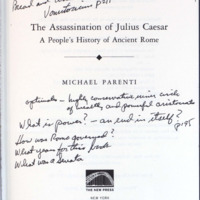-
Title
-
The assassination of Julius Caesar : a people's history of ancient Rome
-
Description
-
Most historians, both ancient and modern, have viewed the Late Republic of Rome through the eyes of its rich nobility. They regard Roman commoners as a parasitic mob, a rabble interested only in bread and circuses. They cast Caesar, who took up the popular cause, as a despot and demagogue, and treat his murder as the outcome of a personal feud or constitutional struggle, devoid of social content. In The Assassination of Julius Caesar, the author Michael Parenti subjects these assertions of gentlemen historians" to a bracing critique, and presents us with a compelling story of popular resistance against entrenched power and wealth. Parenti shows that Caesar was only the last in a line of reformers, dating back across the better part of a century, who were murdered by opulent conservatives. Caesar's assassination set in motion a protracted civil war, the demise of a five-hundred-year republic, and the emergence of an absolutist rule that would prevail over Western Europe for centuries to come." "Parenti reconstructs the social and political context of Caesar's murder, offering fascinating details about Roman society. In these pages we encounter money-driven elections, the struggle for economic democracy, the use of religious augury as an instrument of social control, the sexual abuse of slaves, and the political use of homophobic attacks. Here is a story of empire and corruption, patriarchs and subordinated women, self-enriching capitalists and plundered provinces, slumlords and urban rioters, death squads and political witch-hunts."--Jacket.
-
Identifier
-
1123988
-
1565847970
-
Creator
-
Parenti, Michael
-
Source
-
Brian Lamb Booknotes Collection
-
Gift of Brian Lamb, 2011.
-
Catalog record
-
Language
-
eng
-
Date
-
2003
-
Program air date: September 7, 2003
-
Publisher
-
New Press
-
George Mason University. Libraries. Special Collections & Archives
-
Text
-
Transcription of Annotations
Front endpapers contain notes criticizing classical historians of the modern era for adopting the political biases of ancient historians and of those in the Roman aristocracy and of reiterating misinformation. In the author's opinion Caesar tried to redistribute wealth. Also included in the notes is a list of the names of Roman historians and aristocrats - Sulla, Cicero, Tiberius, Plutarch, Marcus Octavius, Appian, Claudius, Milo, Catiline, Marc Anthony, Cato (the younger), and Marcus Brutus, as well as a list of Latin terms, some of which include definitions, e.g. 'lex agraria' - a proposed law change regarding land reform, and 'optimates' - the highly conservative inner circle of wealthy and powerful aristocrats. The notes also list three forms of governance - kingship, aristocracy and democracy - and provide some information on Caesar's life and assassination. These questions and statements are part of the notes: "How republican was the Late Republic of Rome?" - "The film 'Gladiator': how is the Roman Senate portrayed?" - "Difference between Rome and Italy." - "Cato committed suicide in 46 B.C." - "After five centuries the Roman Republic came to an end under Augustus." - "What is [a] gentleman historian?" - "What is power - an end in itself?" - "How was Rome governed?" - "What was a senator?" - Annotations by Brian Lamb in the margins and underlining of pertinent phrases throughout the book. -- Examples: p. 32: "In Rome's Late Republic, as in any plutocracy, it was a disgrace to be poor and an honor to be rich." -- p. 58: "Senate oligarchs preserve the law as long as it serves the interests of wealth." - p. 84: "Cicero - a great favorite among historians." -- p. 158: Caesar did much the opposite. He initiated popular reforms, restored the tribunes' authority, avoided the use of terror, made alliances with popular leaders, divested the senatorial oligarchy of much of its power, and maintained the grain dole." -- p. 222: "In the highly skewed accounts of what is called history, Cicero, Brutus, Cato, and other oligarchs come down to us as the defenders of republican liberty; while Caesar - who tried to move against their power and privilege and do something for the poor - comes down to us as a tyrant and usurper."
-
Subject
-
"Caesar, Julius--Assassination."
-
Relation
-
Original Booknotes interview
-
Rights
-
This work may be protected by copyright laws and is provided for educational and research purposes only. Any infringing use may be subject to disciplinary action and/or civil or criminal liability as provided by law. If you believe that you are the rights-holder and object to Mason’s use of this image, please contact speccoll@gmu.edu.
 1123988.pdf
1123988.pdf